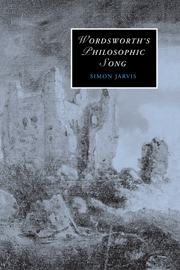2 - From idolatry to ideology
Published online by Cambridge University Press: 22 September 2009
Summary
In the last chapter, I considered Wordsworth's thinking about idolatry and idol-breaking in relation to the century preceding his poetic activity. This, however, is insufficient. The motif has a history of millennia, all of which is part, however inconvenient this might be, of what is called the socio-historical material specificity relevant to Wordsworth's long poem. For this reason, this chapter steps back from Wordsworth's poetry to take a broader view of the aporias of ideology and idolatry.
The opening lines of The German Ideology have often been quoted but have sometimes been read too quickly.
Until now human beings have always formed false ideas about themselves, and about what they are or should be. They have ordered their own relations according to their ideas of God, of normal human beings, etc. The progeny of their heads have got out of control. They, the creators, have bowed down before their own creations. Let us free them from the chimeras, the ideas, the dogmas, the insane imaginations under whose yoke they are wasting away. Let us rebel against this dominion of thoughts. Let us teach them to exchange these imaginations for thoughts which correspond to the real nature of humanity, says one; to conduct themselves critically towards them, says another; to get them out of their heads, says another, and – existing actuality will collapse.
These innocent and childish fantasies form the core of recent young-Hegelian philosophy, which is not only received by the German public with horror and awe, but which is also proclaimed by the philosophical heroes themselves with a solemn consciousness of its world-shattering danger and criminal ruthlessness. The first volume of this publication aims to unmask these sheep in wolves' clothing …
- Type
- Chapter
- Information
- Wordsworth's Philosophic Song , pp. 56 - 83Publisher: Cambridge University PressPrint publication year: 2006



